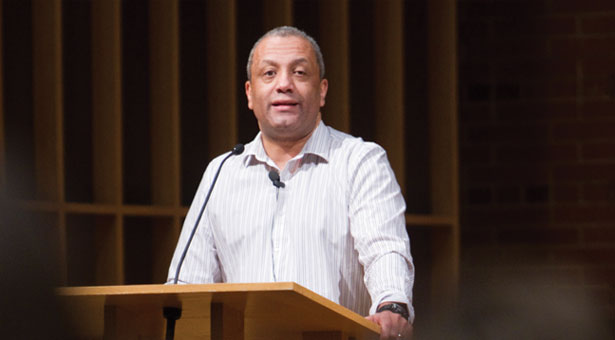The Bible & Theology Toward Christian Maturity
Theology, Psychology, and Health Care Meet in Discussions of Disability
Beyond Inclusion
By Kathy Henning (kathy@spu.edu) | Photo by Mike Siegel

“Perhaps above all else, belonging means coming to know one another through Jesus,” said John Swinton in his 2012 Palmer Lecture on the theology of disability.
Christians like to trumpet their inclusiveness toward people with disabilities. But inclusiveness does not go far enough, said John Swinton in the 35th annual Alfred S. Palmer Lecture on January
12, 2012.
“When you belong, people long for your presence in the same way the Prodigal Son’s father longed
for the presence of the wayward son, in the same way that God longs for us to return to God’s heart,” he said. “To be included you just need to be present. To belong you need to be missed.”
Swinton is chair in divinity and religious studies, professor in practical theology and pastoral care, and director of the Centre for Spirituality, Health, and Disability at King’s College, University of Aberdeen. Ordained in the Church of Scotland, he supports the church around the world. His research and writing focus on practical theology, pastoral care, mental health studies, disability theology, and the question of humanness.
His visit to Seattle Pacific University, during which he gave eight presentations, was sponsored by
SPU’s School of Theology in partnership with the School of Psychology, Family, and Community
and the School of Health Sciences. The Palmer Lecture, titled “From Inclusion to Belonging: A Practical Theology of Disability and Humanness,” was his eighth and final presentation.
“What Dr. Swinton offered was a way for us to embrace who we are at SPU — a university that sees God working through all its disciplines — and to come together around a common question, ‘What does it mean to belong?’” says Jeff Keuss, SPU professor of Christian ministry.
Listen to Swinton’s lecture at spu.edu/itunes.
